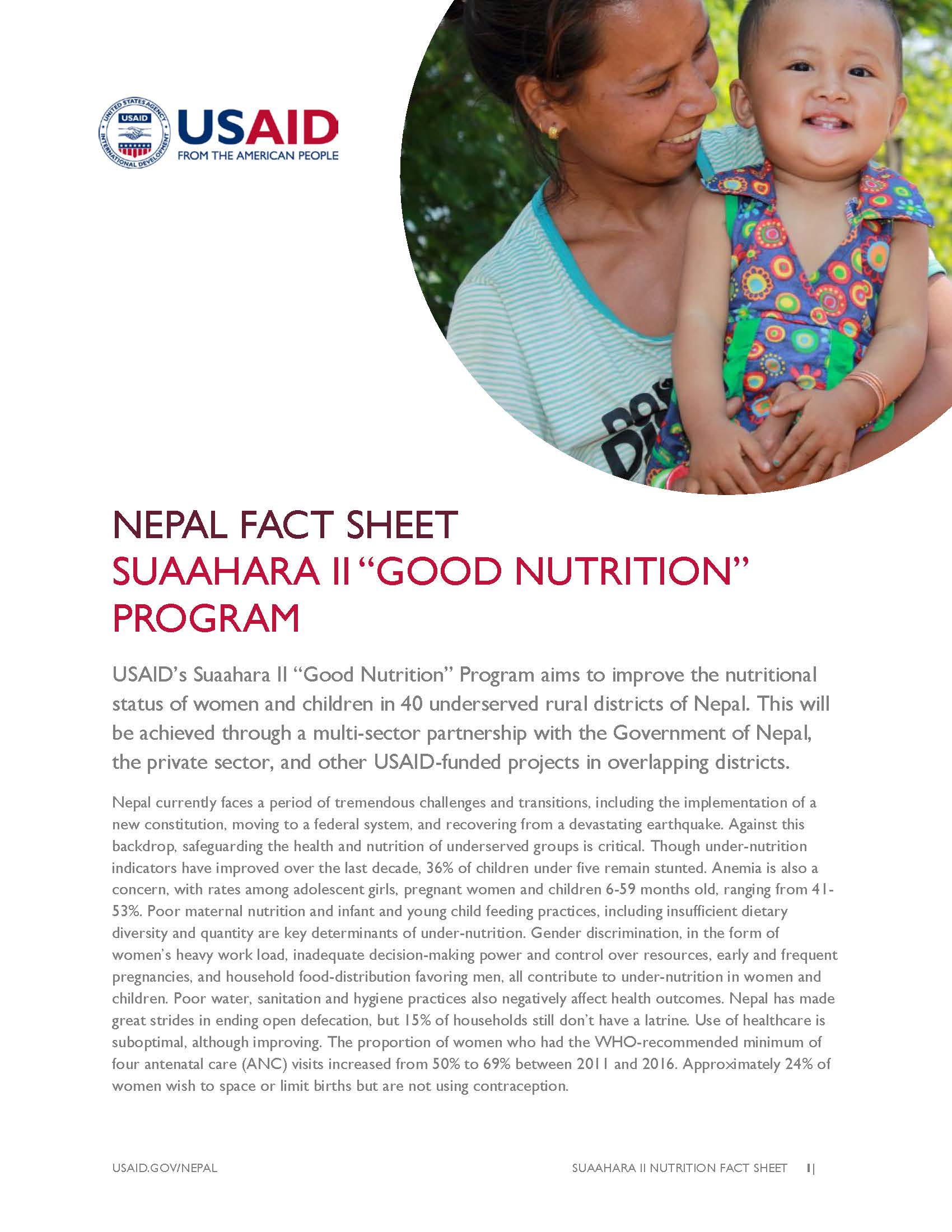Speeches Shim
Nepal currently faces a period of tremendous challenges and transitions, including the implementation of a new constitution, moving to a federal system, and recovering from a devastating earthquake. Against this backdrop, safeguarding the health and nutrition of underserved groups is critical. Though under-nutrition indicators have improved over the last decade, 36% of children under five remain stunted. Anemia is also a concern, with rates among adolescent girls, pregnant women and children 6-59 months old, ranging from 41-53%. Poor maternal nutrition and infant and young child feeding practices, including insufficient dietary diversity and quantity are key determinants of under-nutrition. Gender discrimination, in the form of women’s heavy work load, inadequate decision-making power and control over resources, early and frequent pregnancies, and household food-distribution favoring men, all contribute to under-nutrition in women and children. Poor water, sanitation and hygiene practices also negatively affect health outcomes. Nepal has made great strides in ending open defecation, but 15% of households still don’t have a latrine. Use of healthcare is suboptimal, although improving. The proportion of women who had the WHO-recommended minimum of four antenatal care (ANC) visits increased from 50% to 69% between 2011 and 2016. Approximately 24% of women wish to space or limit births but are not using contraception.
PROJECT OVERVIEW
Suaahara II is a five-year (2016-2021), $63 million integrated program dedicated to improving the health and nutrition status of women and children who fall within the 1,000 days period, from conception until a child reaches 24 months of age. This period is recognized as the crucial timeframe during which nutritional interventions have optimal impact on child growth and development. In selected districts, Suaahara II will support the Government of Nepal (GON) in expanding health and nutrition services that target adolescents. In particular, the project will address anemia, reproductive health, menstrual hygiene, food diversity, social attitudes towards delayed marriage and pregnancy, and health service utilization. Suaahara II will also collaborate with existing projects and private sector groups towards shared objectives.
PROJECT OBJECTIVES
- Promote key Maternal, Infant and Young Child Nutrition (MIYCN) practices through an intensivebehavior change strategy, including interpersonal communication activities, radio programs, and theuse of mobile technology at the community level.
- Expand coverage of the community-based integrated management of newborn and childhood illnessprogram and strengthen growth monitoring and promotion at outreach clinics and health facilities.
- Enhance clean water, sanitation, and hygiene conditions of household facilities and establish privatesector linkages to promote WASH technologies.
- Improve consumption of nutritious food through increased production, improved post-harveststorage, and processing diverse nutritious food, especially for women farmers from disadvantagedgroups.
- Strengthen coordination on health and nutrition between government and other stakeholdersthrough the Food Security and Nutrition Coordination Committee, Nepal Nutrition Group,Nutrition Technical Committee, Safe Motherhood sub- committee, Family Planning Sub -committee,and Reproductive Health Coordination Committee.
- Strengthen the technical, managerial, operational capacity of health and non-health sectorstakeholders at the district and Village Development Committee (VDC) levels to enhance MSNPimplementation.
KEY OUTCOMES
- Reduce stunting, underweight, and wasting prevalence among children under five in 40 targetdistricts.
- Improve household health and nutrition behaviors.
- Increase use of quality maternal, newborn, and child health services; family planning services.
- Improve water, sanitation and hygiene behavior and practices.
- Increased consumption of diverse and nutritious foods by women and their families.
- Improve the food security of households.
- Transfer of key nutrition and health services in 15 Suaahara districts to GON management asappropriate.


Comment
Make a general inquiry or suggest an improvement.